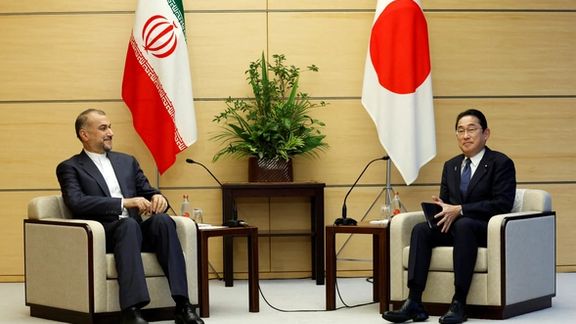Iran FM Visiting Japan Pursues Release Of Frozen Funds

Iranian Foreign Minister Hossein Amir-Abdollahian visited Japan on Monday as a possible move to cajole Tokyo into releasing its $3 billion frozen in banks there.

Iranian Foreign Minister Hossein Amir-Abdollahian visited Japan on Monday as a possible move to cajole Tokyo into releasing its $3 billion frozen in banks there.
Amir-Abdollahian, the first Iranian foreign minister to visit Japan since Iranian President Ebrahim Raisi took office in August 2021, met with his counterpart Yoshimasa Hayashi, Japanese Prime Minister Fumio Kishida and Health, Labour and Welfare Minister Katsunobu Katō on Monday.
The readout from his meetings did not mention any talks about Iran’s funds mainly from exports of oil frozen due to US sanctions, but Iranian Foreign Ministry spokesman Nasser Kanaani said earlier in the day that following up the issue was on the minister’s agenda during his trip.
Amir-Abdollahian most likely raised the issue of the funds, as Tehran is also pressuring South Korea to release $7 billion frozen by two Seoul banks. Iran has tens of billions of dollars worth of funds in foreign banks that it cannot access because of US sanctions. The funds are mostly kept in banks in South Korea, Iraq, China, Japan and India where Iran is owed for shipments of crude and other oil products that took place before the United States pulled out of the 2015 nuclear deal and re-imposed full energy sanctions on Tehran in 2018 and 2019.
Kanani emphasized Monday that “We will continue to follow up on the issue of unfreezing Iranian funds held in various countries, as we did before,” adding that the issue has been raised at different levels, such as during a meeting on the sidelines of the 77th session of the United Nations General Assembly in New York last year when Raisi and Kishida discussed the matter. He went on to say that the Japanese government has repeatedly announced its readiness to repatriate the frozen assets and is making efforts to make this happen.

A lot of recent reports and statements point to an interim deal with the possible release of regime funds in exchange for several US citizens held hostage in Iran and a freeze in Iran's nuclear program. Both the nuclear talks and the prisoner release talks have not succeeded in making meaningful progress. However, US officials say that efforts to secure the release of four Americans continue.
Japan – which holds this year's presidency of the Group of Seven nations – may seek to reduce Iran’s tension with the West to facilitate its dealings with Tehran; the most pressing issue is perhaps Tehran’s military support for Moscow’s invasion of Ukraine, deemed a threat to Europe.
According to the readout of Amir-Abdollahian's meeting with his Japanese counterpart, apart from the usual calls for bolstering bilateral relations “in fields such as medical, environment and disaster risk reduction,” the most important issue discussed was Iran’s supply of drones and missiles for the Russian war on Ukraine.
As was reported before the visit, Japan urged Iran not to provide Russia with weapons for its war against Ukraine, with Foreign Minister Hayashi calling on Tehran “to respond in a constructive manner.” The two agreed to continue "close communication" over issues affecting the Middle East, Japan's Foreign Ministry said. It also said the ministers exchanged “frank views” on the latest developments surrounding Iran’s nuclear issue.
The Japanese diplomat stated that Tokyo has consistently supported the Joint Comprehensive Plan of Action (JCPOA) and is “seriously concerned about the expansion of Iran’s nuclear activities,” calling on Iran to take constructive measures including the full and unconditional cooperation under the latest joint statement between Iran and the International Atomic Energy Agency (IAEA).
Between 2006 and 2015, Tokyo fully supported the four UN sanctions resolutions designed to prevent the regime from developing nuclear weapons. Japan also complied with US sanctions reimposed by the Trump administration in 2018, which sought to eliminate all Iran’s oil exports.
Amir-Abdollahian explained that Iran is pursuing the restoration of the JCPOA through negotiations, and expressed his appreciation for Japan’s diplomatic efforts, noting that Iran seeks to continue close communication with Japan on the matter.
Later in the day, Amir-Abdollahian held a press conference in the Japanese capital, where he used it as an opportunity to further deny the extent of Iran’s involvement in the Russian invasion, calling claims “completely wrong and incorrect,” and instead blaming the conflict on the US-led NATO military alliance and its provocations, in spite of troves of evidence to the contrary.
“We consider NATO and its provocations among the root causes of the war and crisis. We continue our efforts to stop the war and make the parties focus on a political solution,” he said, claiming that “We have provided no parties [to the war] with drones for use in Ukraine.”
His remarks came just a day after Russia used 27 Iranian-made drones and 30 missiles to attack large swaths of Ukraine. Ukrainian officials said all 27 Shahed 136 and 131 drones were shot down by air defenses but some of the missiles fired from the Black Sea and the Caspian region got through.